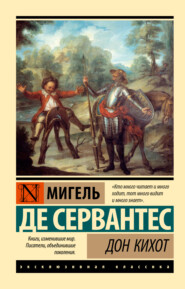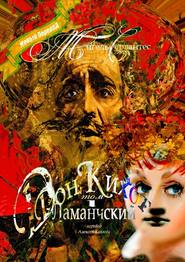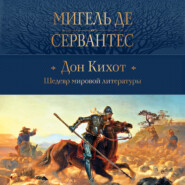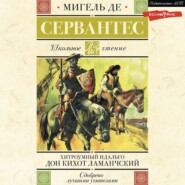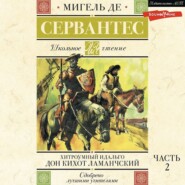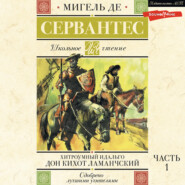По всем вопросам обращайтесь на: info@litportal.ru
(©) 2003-2025.
✖
The History of Don Quixote, Volume 2, Part 34
Настройки чтения
Размер шрифта
Высота строк
Поля
Don Quixote left him, and hastened to the castle to tell the duke and duchess what had happened Sancho, and they were not a little astonished at it; they could easily understand his having fallen, from the confirmatory circumstance of the cave which had been in existence there from time immemorial; but they could not imagine how he had quitted the government without their receiving any intimation of his coming. To be brief, they fetched ropes and tackle, as the saying is, and by dint of many hands and much labour they drew up Dapple and Sancho Panza out of the darkness into the light of day. A student who saw him remarked, "That's the way all bad governors should come out of their governments, as this sinner comes out of the depths of the pit, dead with hunger, pale, and I suppose without a farthing."
Sancho overheard him and said, "It is eight or ten days, brother growler, since I entered upon the government of the island they gave me, and all that time I never had a bellyful of victuals, no not for an hour; doctors persecuted me and enemies crushed my bones; nor had I any opportunity of taking bribes or levying taxes; and if that be the case, as it is, I don't deserve, I think, to come out in this fashion; but 'man proposes and God disposes;' and God knows what is best, and what suits each one best; and 'as the occasion, so the behaviour;' and 'let nobody say "I won't drink of this water;"' and 'where one thinks there are flitches, there are no pegs;' God knows my meaning and that's enough; I say no more, though I could."
"Be not angry or annoyed at what thou hearest, Sancho," said Don Quixote, "or there will never be an end of it; keep a safe conscience and let them say what they like; for trying to stop slanderers' tongues is like trying to put gates to the open plain. If a governor comes out of his government rich, they say he has been a thief; and if he comes out poor, that he has been a noodle and a blockhead."
"They'll be pretty sure this time," said Sancho, "to set me down for a fool rather than a thief."
Thus talking, and surrounded by boys and a crowd of people, they reached the castle, where in one of the corridors the duke and duchess stood waiting for them; but Sancho would not go up to see the duke until he had first put up Dapple in the stable, for he said he had passed a very bad night in his last quarters; then he went upstairs to see his lord and lady, and kneeling before them he said, "Because it was your highnesses' pleasure, not because of any desert of my own, I went to govern your island of Barataria, which 'I entered naked, and naked I find myself; I neither lose nor gain.' Whether I have governed well or ill, I have had witnesses who will say what they think fit. I have answered questions, I have decided causes, and always dying of hunger, for Doctor Pedro Recio of Tirteafuera, the island and governor doctor, would have it so. Enemies attacked us by night and put us in a great quandary, but the people of the island say they came off safe and victorious by the might of my arm; and may God give them as much health as there's truth in what they say. In short, during that time I have weighed the cares and responsibilities governing brings with it, and by my reckoning I find my shoulders can't bear them, nor are they a load for my loins or arrows for my quiver; and so, before the government threw me over I preferred to throw the government over; and yesterday morning I left the island as I found it, with the same streets, houses, and roofs it had when I entered it. I asked no loan of anybody, nor did I try to fill my pocket; and though I meant to make some useful laws, I made hardly any, as I was afraid they would not be kept; for in that case it comes to the same thing to make them or not to make them. I quitted the island, as I said, without any escort except my ass; I fell into a pit, I pushed on through it, until this morning by the light of the sun I saw an outlet, but not so easy a one but that, had not heaven sent me my master Don Quixote, I'd have stayed there till the end of the world. So now my lord and lady duke and duchess, here is your governor Sancho Panza, who in the bare ten days he has held the government has come by the knowledge that he would not give anything to be governor, not to say of an island, but of the whole world; and that point being settled, kissing your worships' feet, and imitating the game of the boys when they say, 'leap thou, and give me one,' I take a leap out of the government and pass into the service of my master Don Quixote; for after all, though in it I eat my bread in fear and trembling, at any rate I take my fill; and for my part, so long as I'm full, it's all alike to me whether it's with carrots or with partridges."
Here Sancho brought his long speech to an end, Don Quixote having been the whole time in dread of his uttering a host of absurdities; and when he found him leave off with so few, he thanked heaven in his heart. The duke embraced Sancho and told him he was heartily sorry he had given up the government so soon, but that he would see that he was provided with some other post on his estate less onerous and more profitable. The duchess also embraced him, and gave orders that he should be taken good care of, as it was plain to see he had been badly treated and worse bruised.
CHAPTER LVI.
OF THE PRODIGIOUS AND UNPARALLELED BATTLE THAT TOOK PLACE BETWEEN DON QUIXOTE OF LA MANCHA AND THE LACQUEY TOSILOS IN DEFENCE OF THE DAUGHTER OF DONA RODRIGUEZ
The duke and duchess had no reason to regret the joke that had been played upon Sancho Panza in giving him the government; especially as their majordomo returned the same day, and gave them a minute account of almost every word and deed that Sancho uttered or did during the time; and to wind up with, eloquently described to them the attack upon the island and Sancho's fright and departure, with which they were not a little amused. After this the history goes on to say that the day fixed for the battle arrived, and that the duke, after having repeatedly instructed his lacquey Tosilos how to deal with Don Quixote so as to vanquish him without killing or wounding him, gave orders to have the heads removed from the lances, telling Don Quixote that Christian charity, on which he plumed himself, could not suffer the battle to be fought with so much risk and danger to life; and that he must be content with the offer of a battlefield on his territory (though that was against the decree of the holy Council, which prohibits all challenges of the sort) and not push such an arduous venture to its extreme limits. Don Quixote bade his excellence arrange all matters connected with the affair as he pleased, as on his part he would obey him in everything. The dread day, then, having arrived, and the duke having ordered a spacious stand to be erected facing the court of the castle for the judges of the field and the appellant duennas, mother and daughter, vast crowds flocked from all the villages and hamlets of the neighbourhood to see the novel spectacle of the battle; nobody, dead or alive, in those parts having ever seen or heard of such a one.
The first person to enter the-field and the lists was the master of the ceremonies, who surveyed and paced the whole ground to see that there was nothing unfair and nothing concealed to make the combatants stumble or fall; then the duennas entered and seated themselves, enveloped in mantles covering their eyes, nay even their bosoms, and displaying no slight emotion as Don Quixote appeared in the lists. Shortly afterwards, accompanied by several trumpets and mounted on a powerful steed that threatened to crush the whole place, the great lacquey Tosilos made his appearance on one side of the courtyard with his visor down and stiffly cased in a suit of stout shining armour. The horse was a manifest Frieslander, broad-backed and flea-bitten, and with half a hundred of wool hanging to each of his fetlocks. The gallant combatant came well primed by his master the duke as to how he was to bear himself against the valiant Don Quixote of La Mancha; being warned that he must on no account slay him, but strive to shirk the first encounter so as to avoid the risk of killing him, as he was sure to do if he met him full tilt. He crossed the courtyard at a walk, and coming to where the duennas were placed stopped to look at her who demanded him for a husband; the marshal of the field summoned Don Quixote, who had already presented himself in the courtyard, and standing by the side of Tosilos he addressed the duennas, and asked them if they consented that Don Quixote of La Mancha should do battle for their right. They said they did, and that whatever he should do in that behalf they declared rightly done, final and valid. By this time the duke and duchess had taken their places in a gallery commanding the enclosure, which was filled to overflowing with a multitude of people eager to see this perilous and unparalleled encounter. The conditions of the combat were that if Don Quixote proved the victor his antagonist was to marry the daughter of Dona Rodriguez; but if he should be vanquished his opponent was released from the promise that was claimed against him and from all obligations to give satisfaction. The master of the ceremonies apportioned the sun to them, and stationed them, each on the spot where he was to stand. The drums beat, the sound of the trumpets filled the air, the earth trembled under foot, the hearts of the gazing crowd were full of anxiety, some hoping for a happy issue, some apprehensive of an untoward ending to the affair, and lastly, Don Quixote, commending himself with all his heart to God our Lord and to the lady Dulcinea del Toboso, stood waiting for them to give the necessary signal for the onset. Our lacquey, however, was thinking of something very different; he only thought of what I am now going to mention.
It seems that as he stood contemplating his enemy she struck him as the most beautiful woman he had ever seen all his life; and the little blind boy whom in our streets they commonly call Love had no mind to let slip the chance of triumphing over a lacquey heart, and adding it to the list of his trophies; and so, stealing gently upon him unseen, he drove a dart two yards long into the poor lacquey's left side and pierced his heart through and through; which he was able to do quite at his ease, for Love is invisible, and comes in and goes out as he likes, without anyone calling him to account for what he does. Well then, when they gave the signal for the onset our lacquey was in an ecstasy, musing upon the beauty of her whom he had already made mistress of his liberty, and so he paid no attention to the sound of the trumpet, unlike Don Quixote, who was off the instant he heard it, and, at the highest speed Rocinante was capable of, set out to meet his enemy, his good squire Sancho shouting lustily as he saw him start, "God guide thee, cream and flower of knights-errant! God give thee the victory, for thou hast the right on thy side!" But though Tosilos saw Don Quixote coming at him he never stirred a step from the spot where he was posted; and instead of doing so called loudly to the marshal of the field, to whom when he came up to see what he wanted he said, "Senor, is not this battle to decide whether I marry or do not marry that lady?" "Just so," was the answer. "Well then," said the lacquey, "I feel qualms of conscience, and I should lay a-heavy burden upon it if I were to proceed any further with the combat; I therefore declare that I yield myself vanquished, and that I am willing to marry the lady at once."
The marshal of the field was lost in astonishment at the words of Tosilos; and as he was one of those who were privy to the arrangement of the affair he knew not what to say in reply. Don Quixote pulled up in mid career when he saw that his enemy was not coming on to the attack. The duke could not make out the reason why the battle did not go on; but the marshal of the field hastened to him to let him know what Tosilos said, and he was amazed and extremely angry at it. In the meantime Tosilos advanced to where Dona Rodriguez sat and said in a loud voice, "Senora, I am willing to marry your daughter, and I have no wish to obtain by strife and fighting what I can obtain in peace and without any risk to my life."
The valiant Don Quixote heard him, and said, "As that is the case I am released and absolved from my promise; let them marry by all means, and as 'God our Lord has given her, may Saint Peter add his blessing.'"
The duke had now descended to the courtyard of the castle, and going up to Tosilos he said to him, "Is it true, sir knight, that you yield yourself vanquished, and that moved by scruples of conscience you wish to marry this damsel?"
"It is, senor," replied Tosilos.
"And he does well," said Sancho, "for what thou hast to give to the mouse, give to the cat, and it will save thee all trouble."
Tosilos meanwhile was trying to unlace his helmet, and he begged them to come to his help at once, as his power of breathing was failing him, and he could not remain so long shut up in that confined space. They removed it in all haste, and his lacquey features were revealed to public gaze. At this sight Dona Rodriguez and her daughter raised a mighty outcry, exclaiming, "This is a trick! This is a trick! They have put Tosilos, my lord the duke's lacquey, upon us in place of the real husband. The justice of God and the king against such trickery, not to say roguery!"
"Do not distress yourselves, ladies," said Don Quixote; "for this is no trickery or roguery; or if it is, it is not the duke who is at the bottom of it, but those wicked enchanters who persecute me, and who, jealous of my reaping the glory of this victory, have turned your husband's features into those of this person, who you say is a lacquey of the duke's; take my advice, and notwithstanding the malice of my enemies marry him, for beyond a doubt he is the one you wish for a husband."
When the duke heard this all his anger was near vanishing in a fit of laughter, and he said, "The things that happen to Senor Don Quixote are so extraordinary that I am ready to believe this lacquey of mine is not one; but let us adopt this plan and device; let us put off the marriage for, say, a fortnight, and let us keep this person about whom we are uncertain in close confinement, and perhaps in the course of that time he may return to his original shape; for the spite which the enchanters entertain against Senor Don Quixote cannot last so long, especially as it is of so little advantage to them to practise these deceptions and transformations."
"Oh, senor," said Sancho, "those scoundrels are well used to changing whatever concerns my master from one thing into another. A knight that he overcame some time back, called the Knight of the Mirrors, they turned into the shape of the bachelor Samson Carrasco of our town and a great friend of ours; and my lady Dulcinea del Toboso they have turned into a common country wench; so I suspect this lacquey will have to live and die a lacquey all the days of his life."
Here the Rodriguez's daughter exclaimed, "Let him be who he may, this man that claims me for a wife; I am thankful to him for the same, for I had rather be the lawful wife of a lacquey than the cheated mistress of a gentleman; though he who played me false is nothing of the kind."
To be brief, all the talk and all that had happened ended in Tosilos being shut up until it was seen how his transformation turned out. All hailed Don Quixote as victor, but the greater number were vexed and disappointed at finding that the combatants they had been so anxiously waiting for had not battered one another to pieces, just as the boys are disappointed when the man they are waiting to see hanged does not come out, because the prosecution or the court has pardoned him. The people dispersed, the duke and Don Quixote returned to the castle, they locked up Tosilos, Dona Rodriguez and her daughter remained perfectly contented when they saw that any way the affair must end in marriage, and Tosilos wanted nothing else.
CHAPTER LVII.
WHICH TREATS OF HOW DON QUIXOTE TOOK LEAVE OF THE DUKE, AND OF WHAT FOLLOWED WITH THE WITTY AND IMPUDENT ALTISIDORA, ONE OF THE DUCHESS'S DAMSELS
Don Quixote now felt it right to quit a life of such idleness as he was leading in the castle; for he fancied that he was making himself sorely missed by suffering himself to remain shut up and inactive amid the countless luxuries and enjoyments his hosts lavished upon him as a knight, and he felt too that he would have to render a strict account to heaven of that indolence and seclusion; and so one day he asked the duke and duchess to grant him permission to take his departure. They gave it, showing at the same time that they were very sorry he was leaving them.
The duchess gave his wife's letters to Sancho Panza, who shed tears over them, saying, "Who would have thought that such grand hopes as the news of my government bred in my wife Teresa Panza's breast would end in my going back now to the vagabond adventures of my master Don Quixote of La Mancha? Still I'm glad to see my Teresa behaved as she ought in sending the acorns, for if she had not sent them I'd have been sorry, and she'd have shown herself ungrateful. It is a comfort to me that they can't call that present a bribe; for I had got the government already when she sent them, and it's but reasonable that those who have had a good turn done them should show their gratitude, if it's only with a trifle. After all I went into the government naked, and I come out of it naked; so I can say with a safe conscience – and that's no small matter – 'naked I was born, naked I find myself, I neither lose nor gain.'"
Thus did Sancho soliloquise on the day of their departure, as Don Quixote, who had the night before taken leave of the duke and duchess, coming out made his appearance at an early hour in full armour in the courtyard of the castle. The whole household of the castle were watching him from the corridors, and the duke and duchess, too, came out to see him. Sancho was mounted on his Dapple, with his alforjas, valise, and proven supremely happy because the duke's majordomo, the same that had acted the part of the Trifaldi, had given him a little purse with two hundred gold crowns to meet the necessary expenses of the road, but of this Don Quixote knew nothing as yet. While all were, as has been said, observing him, suddenly from among the duennas and handmaidens the impudent and witty Altisidora lifted up her voice and said in pathetic tones:
Give ear, cruel knight;
Draw rein; where's the need
Of spurring the flanks
Of that ill-broken steed?
From what art thou flying?
No dragon I am,
Not even a sheep,
But a tender young lamb.
Thou hast jilted a maiden
As fair to behold
As nymph of Diana
Or Venus of old.
Bireno, AEneas, what worse shall I call thee?
Barabbas go with thee! All evil befall thee!
In thy claws, ruthless robber,
Thou bearest away
The heart of a meek
Loving maid for thy prey,
Three kerchiefs thou stealest,
And garters a pair,
From legs than the whitest
Of marble more fair;
And the sighs that pursue thee
Would burn to the ground
Two thousand Troy Towns,
If so many were found.
Bireno, AEneas, what worse shall I call thee?
Barabbas go with thee! All evil befall thee!
May no bowels of mercy
To Sancho be granted,
And thy Dulcinea
Be left still enchanted,
May thy falsehood to me
Find its punishment in her,
For in my land the just
Often pays for the sinner.
May thy grandest adventures
Discomfitures prove,
May thy joys be all dreams,






